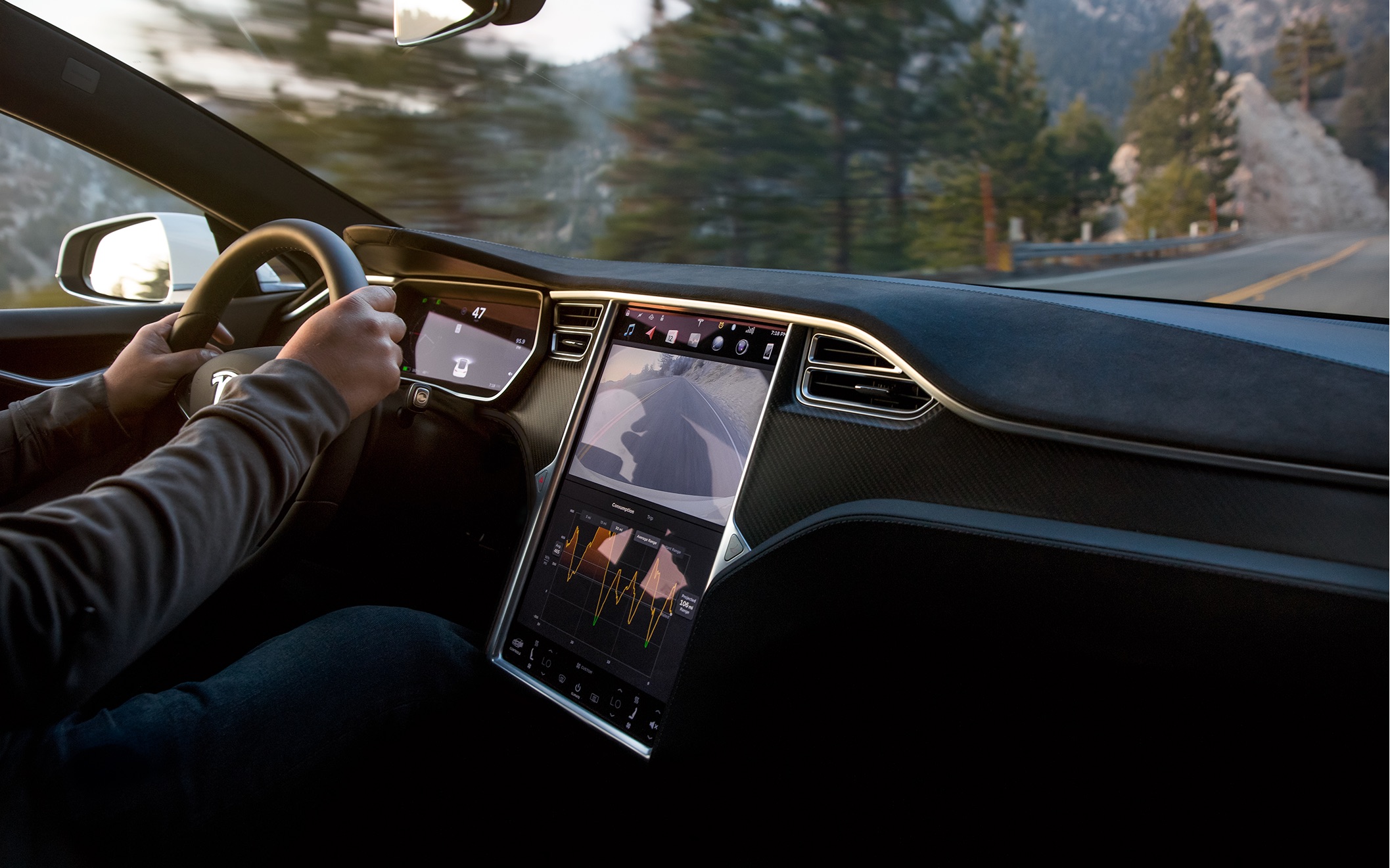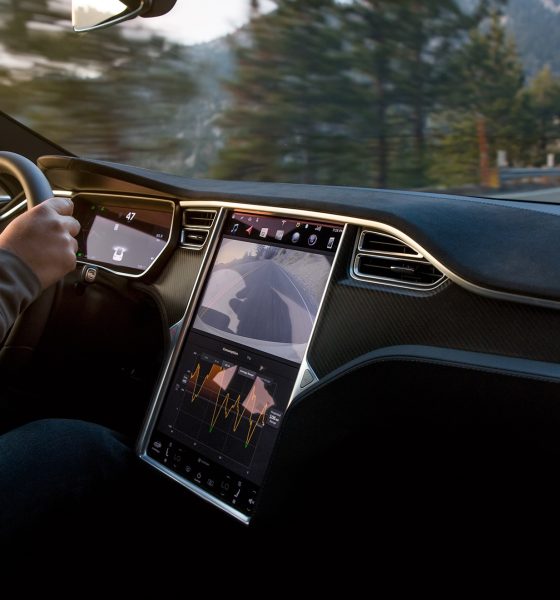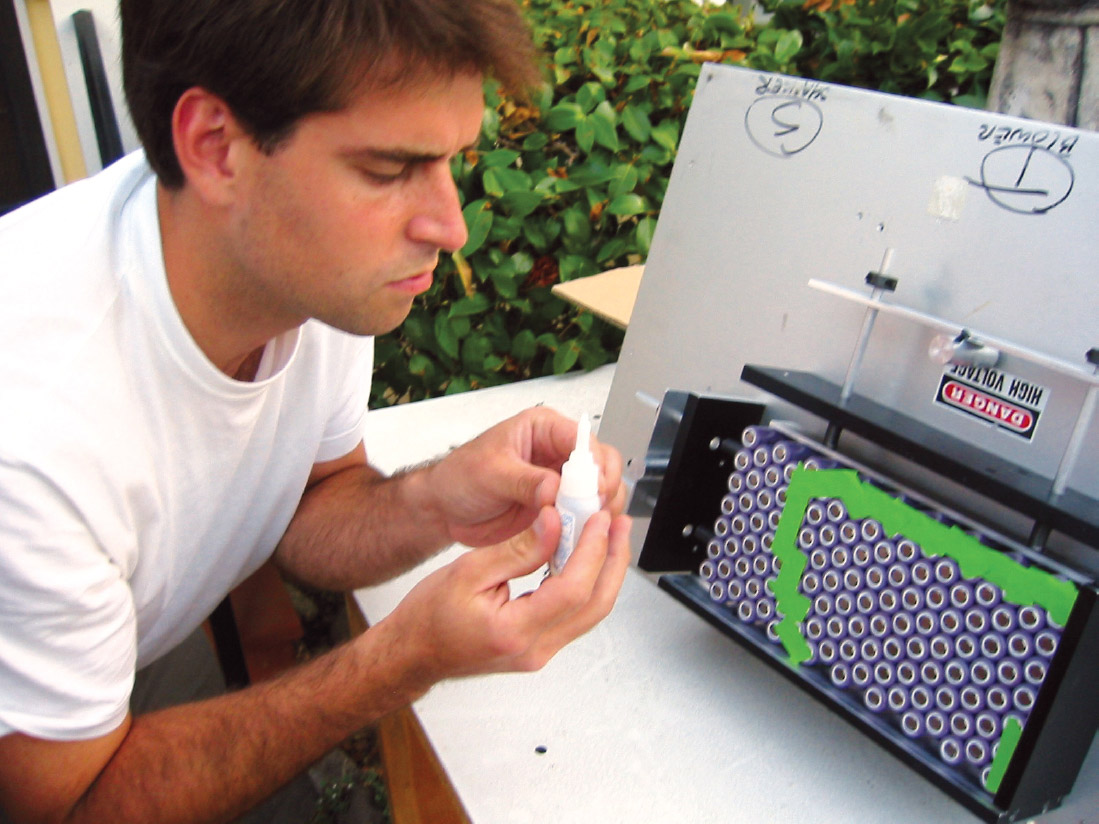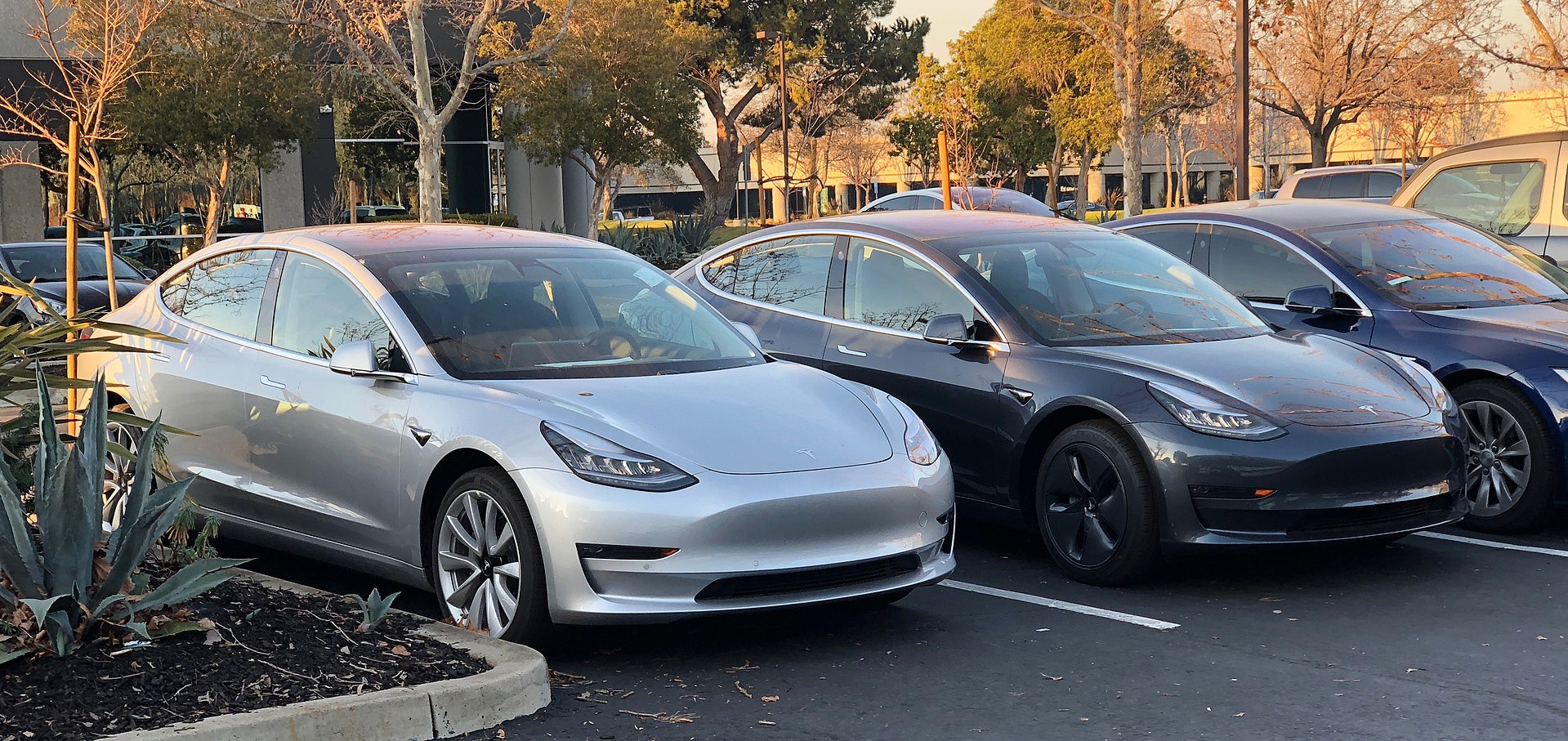

Investor's Corner
Tesla’s battery tech and software push is starting to make sense for veteran vehicle-makers
When Tesla was designing the Model S, the company made it a point to build the vehicle from the ground up. This means that everything, from the electric cars’ battery packs to its software, are manufactured by Tesla itself. Tesla’s approach to electric cars is the auto equivalent of Apple’s strategy with the iPhone and iOS, and it finally seems to be making sense to some legacy vehicle-makers.
Elon Musk’s private space firm, SpaceX, is known for producing its rockets in-house. Musk took this same approach with Tesla in the company’s early days, and the result of this approach was the Model S, a vehicle like no other on the road, with simple, powerful, all-electric internals and a software that is custom-built for the car. A particularly telling image of this hands-on, in-house approach was taken during the company’s younger days, featuring a much younger CTO JB Straubel assembling one of Tesla’s early battery packs by hand.

And in a lot of ways, this strategy worked. Tesla’s in-house approach for the Model S was a key point in the vehicle’s allure to consumers. This carried over to the Model X, and now, the Model 3. With Tesla’s 2170 cells used in the Model 3 gaining rave reviews from teardown experts like Sandy Munro of Munro and Associates, and with the company preparing to release Software Version 9, Tesla is poised to take even bigger steps in its mission to usher the transition to sustainable mobility.
Tesla’s history is rife with criticism and doubts from the veterans of the auto industry, but now that the company has established itself as a leader in the premium electric car segment, its progress and breakthroughs now seem to be undeniable, even to traditional vehicle makers.
Just recently, a report from German publication Electrive emerged, citing insiders from Jaguar who noted that the veteran carmaker will be using Samsung SDI’s cylindrical 2170 battery cells for the electric cars it would produce from 2020 onwards. This is a big step for Jaguar, considering that the I-PACE, its first all-electric vehicle that can actually compete with the Model X 75D and 100D in terms of performance, is currently using pouch cells from LG Chem.
Using Samsung SDI’s 2170 cells for its electric cars’ batteries would likely benefit Jaguar, considering that the I-PACE is currently being bogged down by reports that the vehicle is lacking in efficiency and range. Jaguar might never admit it, but it’s not difficult to infer that the company’s decision to reportedly commit to 2170 cells was partly influenced by Tesla’s progress in its battery tech.
Tesla Model 3s side by side in a parking lot.
Another vehicle-maker is starting to see the value of software and its relationship to hardware. Earlier today, veteran motorcycle maker Harley-Davidson stated that it is planning to open a dedicated research and development facility in Silicon Valley to support its plans for its upcoming line of electric bikes. Harley-Davidson plans to release its first motorcycle, dubbed the “LiveWire,” sometime next year, and it would be the first of a line that features a “twist and go” system. The LiveWire is set to be followed by other electric bikes in 2022 as the company transitions to producing cleaner and possibly even quicker, more powerful vehicles.
Seemingly taking a cue from Tesla, Harley Davidson is now in full throttle recruiting Silicon Valley talent in electrical, software, and mechanical engineering. Just like Jaguar and its decision to commit to 2170 cells, Harley-Davidson’s decision to establish a Silicon Valley-based team seems to be inspired partly by Tesla and its software-focused electric cars.
Tesla is not a perfect company by any means, and its leader, Elon Musk, is not infallible. Musk himself would be the first to admit that Tesla committed a lot of errors in the past, and it is through these failures that the company was able to fail forward. Tesla is now a much more mature electric car maker that knows its market and knows what it’s doing; and if the recent updates from Jaguar and Harley-Davidson are any indication, it appears that other vehicle-makers are now starting to realize the value of Tesla’s experience.

Elon Musk
Tesla stock gets latest synopsis from Jim Cramer: ‘It’s actually a robotics company’
“Turns out it’s actually a robotics and Cybercab company, and I want to buy, buy, buy. Yes, Tesla’s the paper that turned into scissors in one session,” Cramer said.

Tesla stock (NASDAQ: TSLA) got its latest synopsis from Wall Street analyst Jim Cramer, who finally realized something that many fans of the company have known all along: it’s not a car company. Instead, it’s a robotics company.
In a recent note that was released after Tesla reported Earnings in late January, Cramer seemed to recognize that the underwhelming financials and overall performance of the automotive division were not representative of the current state of affairs.
Instead, we’re seeing a company transition itself away from its early identity, essentially evolving like a caterpillar into a butterfly.
The narrative of the Earnings Call was simple: We’re not a car company, at least not from a birds-eye view. We’re an AI and Robotics company, and we are transitioning to this quicker than most people realize.
Tesla stock gets another analysis from Jim Cramer, and investors will like it
Tesla’s Q4 Earnings Call featured plenty of analysis from CEO Elon Musk and others, and some of the more minor details of the call were even indicative of a company that is moving toward AI instead of its cars. For example, the Model S and Model X will be no more after Q2, as Musk said that they serve relatively no purpose for the future.
Instead, Tesla is shifting its focus to the vehicles catered for autonomy and its Robotaxi and self-driving efforts.
Cramer recognizes this:
“…we got results from Tesla, which actually beat numbers, but nobody cares about the numbers here, as electric vehicles are the past. And according to CEO Elon Musk, the future of this company comes down to Cybercabs and humanoid robots. Stock fell more than 3% the next day. That may be because their capital expenditures budget was higher than expected, or maybe people wanted more details from the new businesses. At this point, I think Musk acolytes might be more excited about SpaceX, which is planning to come public later this year.”
He continued, highlighting the company’s true transition away from vehicles to its Cybercab, Optimus, and AI ambitions:
“I know it’s hard to believe how quickly this market can change its attitude. Last night, I heard a disastrous car company speak. Turns out it’s actually a robotics and Cybercab company, and I want to buy, buy, buy. Yes, Tesla’s the paper that turned into scissors in one session. I didn’t like it as a car company. Boy, I love it as a Cybercab and humanoid robot juggernaut. Call me a buyer and give me five robots while I’m at it.”
Cramer’s narrative seems to fit that of the most bullish Tesla investors. Anyone who is labeled a “permabull” has been echoing a similar sentiment over the past several years: Tesla is not a car company any longer.
Instead, the true focus is on the future and the potential that AI and Robotics bring to the company. It is truly difficult to put Tesla shares in the same group as companies like Ford, General Motors, and others.
Tesla shares are down less than half a percent at the time of publishing, trading at $423.69.
Elon Musk
Tesla to a $100T market cap? Elon Musk’s response may shock you

There are a lot of Tesla bulls out there who have astronomical expectations for the company, especially as its arm of reach has gone well past automotive and energy and entered artificial intelligence and robotics.
However, some of the most bullish Tesla investors believe the company could become worth $100 trillion, and CEO Elon Musk does not believe that number is completely out of the question, even if it sounds almost ridiculous.
To put that number into perspective, the top ten most valuable companies in the world — NVIDIA, Apple, Alphabet, Microsoft, Amazon, TSMC, Meta, Saudi Aramco, Broadcom, and Tesla — are worth roughly $26 trillion.
Will Tesla join the fold? Predicting a triple merger with SpaceX and xAI
Cathie Wood of ARK Invest believes the number is reasonable considering Tesla’s long-reaching industry ambitions:
“…in the world of AI, what do you have to have to win? You have to have proprietary data, and think about all the proprietary data he has, different kinds of proprietary data. Tesla, the language of the road; Neuralink, multiomics data; nobody else has that data. X, nobody else has that data either. I could see $100 trillion. I think it’s going to happen because of convergence. I think Tesla is the leading candidate [for $100 trillion] for the reason I just said.”
Musk said late last year that all of his companies seem to be “heading toward convergence,” and it’s started to come to fruition. Tesla invested in xAI, as revealed in its Q4 Earnings Shareholder Deck, and SpaceX recently acquired xAI, marking the first step in the potential for a massive umbrella of companies under Musk’s watch.
SpaceX officially acquires xAI, merging rockets with AI expertise
Now that it is happening, it seems Musk is even more enthusiastic about a massive valuation that would swell to nearly four-times the value of the top ten most valuable companies in the world currently, as he said on X, the idea of a $100 trillion valuation is “not impossible.”
It’s not impossible
— Elon Musk (@elonmusk) February 6, 2026
Tesla is not just a car company. With its many projects, including the launch of Robotaxi, the progress of the Optimus robot, and its AI ambitions, it has the potential to continue gaining value at an accelerating rate.
Musk’s comments show his confidence in Tesla’s numerous projects, especially as some begin to mature and some head toward their initial stages.
Elon Musk
Tesla director pay lawsuit sees lawyer fees slashed by $100 million
The ruling leaves the case’s underlying settlement intact while significantly reducing what the plaintiffs’ attorneys will receive.

The Delaware Supreme Court has cut more than $100 million from a legal fee award tied to a shareholder lawsuit challenging compensation paid to Tesla directors between 2017 and 2020.
The ruling leaves the case’s underlying settlement intact while significantly reducing what the plaintiffs’ attorneys will receive.
Delaware Supreme Court trims legal fees
As noted in a Bloomberg Law report, the case targeted pay granted to Tesla directors, including CEO Elon Musk, Oracle founder Larry Ellison, Kimbal Musk, and Rupert Murdoch. The Delaware Chancery Court had awarded $176 million to the plaintiffs. Tesla’s board must also return stock options and forego years worth of pay.
As per Chief Justice Collins J. Seitz Jr. in an opinion for the Delaware Supreme Court’s full five-member panel, however, the decision of the Delaware Chancery Court to award $176 million to a pension fund’s law firm “erred by including in its financial benefit analysis the intrinsic value” of options being returned by Tesla’s board.
The justices then reduced the fee award from $176 million to $70.9 million. “As we measure it, $71 million reflects a reasonable fee for counsel’s efforts and does not result in a windfall,” Chief Justice Seitz wrote.
Other settlement terms still intact
The Supreme Court upheld the settlement itself, which requires Tesla’s board to return stock and options valued at up to $735 million and to forgo three years of additional compensation worth about $184 million.
Tesla argued during oral arguments that a fee award closer to $70 million would be appropriate. Interestingly enough, back in October, Justice Karen L. Valihura noted that the $176 award was $60 million more than the Delaware judiciary’s budget from the previous year. This was quite interesting as the case was “settled midstream.”
The lawsuit was brought by a pension fund on behalf of Tesla shareholders and focused exclusively on director pay during the 2017–2020 period. The case is separate from other high-profile compensation disputes involving Elon Musk.








